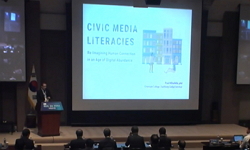This study aims to investigate the textual status and textuality of Korean popular song lyrics released since 2015. While lyrics are inherently constrained by musical elements such as rhythm, syllable count, and melody, which distinguish them from tra...
http://chineseinput.net/에서 pinyin(병음)방식으로 중국어를 변환할 수 있습니다.
변환된 중국어를 복사하여 사용하시면 됩니다.
- 中文 을 입력하시려면 zhongwen을 입력하시고 space를누르시면됩니다.
- 北京 을 입력하시려면 beijing을 입력하시고 space를 누르시면 됩니다.

한국 대중음악 노랫말의 텍스트성 분석 시론―2015년 이후 대중가요를 대상으로― = A Theory of Textuality Analysis of Korean Popular Music Songs : Focusing on Post-2015 Pop Songs Lyrics
한글로보기https://www.riss.kr/link?id=A109743695
-
저자
정주연 (고려대학교 민족문화연구원)
- 발행기관
- 학술지명
- 권호사항
-
발행연도
2025
-
작성언어
Korean
-
주제어
한국 대중음악 노랫말 ; 대중가요 노랫말 ; 텍스트성 ; 응결성 ; 응집성 ; 의도성 ; 정보성 ; 상황성 ; 상호텍스트성 ; Korean pop lyrics ; Popular song lyrics ; textuality ; cohesion ; coherence ; intentionality ; informativity ; situationality ; intertextuality
-
등재정보
KCI등재
-
자료형태
학술저널
-
수록면
335-368(34쪽)
- DOI식별코드
- 제공처
-
0
상세조회 -
0
다운로드
부가정보
다국어 초록 (Multilingual Abstract)
This study aims to investigate the textual status and textuality of Korean popular song lyrics released since 2015. While lyrics are inherently constrained by musical elements such as rhythm, syllable count, and melody, which distinguish them from traditional written texts, this has led to limited research on their textual properties. Recognizing these constraints, the study approaches lyrics as independent texts constructed with specific intentions and within particular contexts by their creators. Using the theoretical framework of textuality proposed by Beaugrande and Dressler—namely cohesion, coherence, intentionality, acceptability, informativity, situationality, and intertextuality—the study conducts a text-linguistic analysis of contemporary Korean pop lyrics. As an exploratory attempt, this research highlights the linguistic features of song lyrics and offers foundational insight into establishing them as a distinct textual genre. Furthermore, it lays the groundwork for future studies that may explore variations in lyrics across different genres and time periods, contributing to a deeper understanding of the evolving nature of popular music texts in Korea.
동일학술지(권/호) 다른 논문
-
- 고려대학교 민족문화연구원
- 김기혁
- 2025
- KCI등재
-
이상과 포스트휴머니즘―하이브리드 인간과 하이브리드 문학 모티프를 중심으로―
- 고려대학교 민족문화연구원
- 고현혜
- 2025
- KCI등재
-
- 고려대학교 민족문화연구원
- 정성권
- 2025
- KCI등재
-
신학철의 ‘역사화’에 재현된 민중의 형상―디디-위베르만의 이미지론을 경유하여―
- 고려대학교 민족문화연구원
- 여문주
- 2025
- KCI등재




 KCI
KCI KISS
KISS






